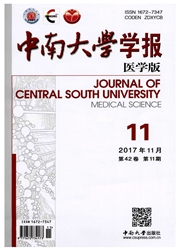

 中文摘要:
中文摘要:
目的:本研究将E1A基因转染HER-2表达阳性的乳腺癌细胞系MCF-7,并研究E1A对MCF-7细胞增殖的抑制作用及其分子机制。方法:利用基因转染技术检测MCF-7细胞中E1A的表达,RT-PCR和Western杂交检测E1A基因对HER-2mRNA和蛋白表达水平的调控,MTT法检测E1A对MCF-7细胞增殖的抑制作用,软琼脂集落法检测E1A对MCF-7细胞集落形成的影响,并利用流式细胞术检测E1A对MCF-7细胞凋亡的调控。结果:MCF-7细胞无内源性的E1A表达,E1A在MCF-7细胞内的表达显著性地降低了细胞中HER-2mRNA和蛋白表达水平,诱导MCF-7细胞发生凋亡。细胞增殖曲线显示E1A基因显著性抑制MCF-7细胞增殖和细胞集落形成能力。结论:E1A基因能降低人乳腺癌细胞MCF-7的HER-2表达,诱导细胞发生凋亡,从而抑制细胞的增殖和细胞集落形成能力。
 英文摘要:
英文摘要:
Objective To explore the molecular mechanism of proliferation inhibition of human breast cancer cell MCF-7 regulated by E1A gene. Methods E1A gene was transfected into MCF-7 cells by liposome reagents. RT-PCR and Western blot were used to detect E1A mRNA and protein expression and HER-2 mRNA in MCF-7. The proliferation and colony formation of MCF-7 were measured by 3 - ( 4,5 - dinmethylthiahiazo- z- yl ) -2,5 - diphenyltetrazolium bromide ( MTT ) assay and soft agar formation assay. The apoptosis of MCF-7 cells regulated by E1A expression was examined by flow cytometry. Results E1A was not endogenously expressed in MCF-7. E1A expression in MCF-7 could significantly decrease HER-2 mRNA and protein expression. Flow cytometry indicated that the apoptosis of MCF-7 could be induced by E1A. Meanwhile, E1A gene could significantly inhibit MCF-7 proliferation and colony formation in soft agar. Conclusion E1A gene can decrease HER-2 expression and induce the apoptosis of human breast cancer cell MCF-7, and inhibit the proliferation and colony formation of MCF-7.
 同期刊论文项目
同期刊论文项目
 同项目期刊论文
同项目期刊论文
 Bone morphogenetic protein-4 induced rat hepatic progenitor cell (WB-F344 cell) differentiation towa
Bone morphogenetic protein-4 induced rat hepatic progenitor cell (WB-F344 cell) differentiation towa 期刊信息
期刊信息
